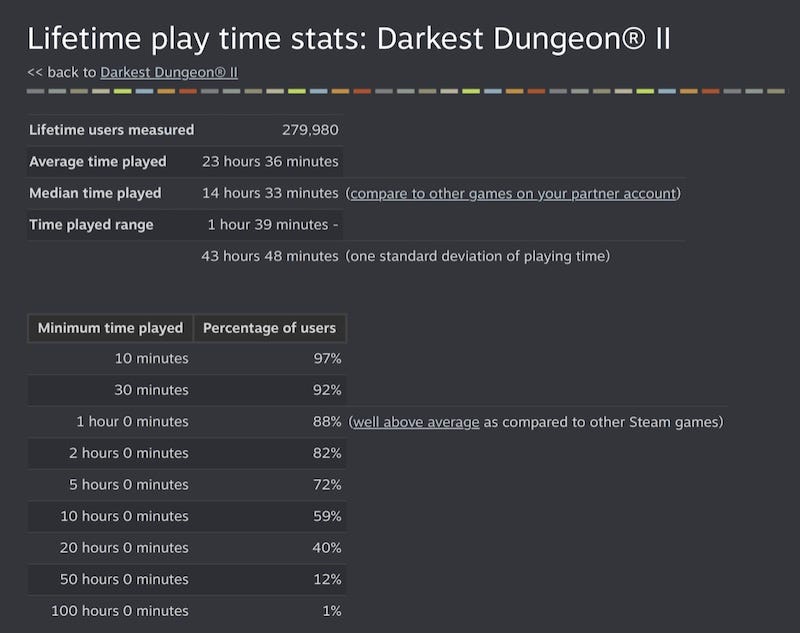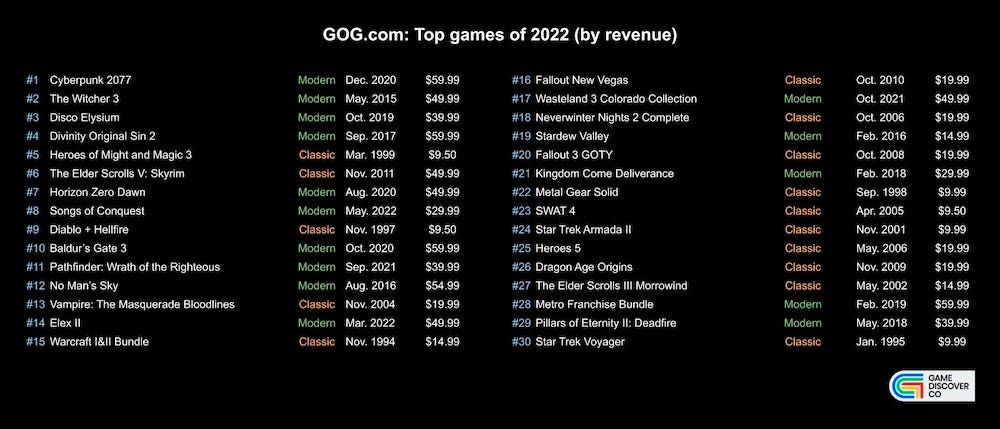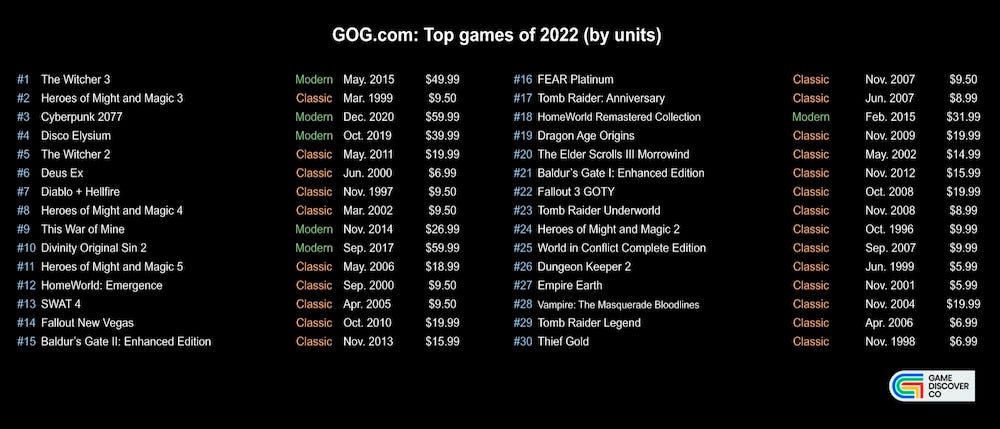Deep dive: how Darkest Dungeon II hit 600k+ units with a 'different' sequel
Publikováno: 7.6.2023
Also: GOG's top-selling titles of 2022 & lots of discovery news.
[The GameDiscoverCo game discovery newsletter is written by ‘how people find your game’ expert & company founder Simon Carless, and is a regular look at how people discover and buy video games in the 2020s.]
We can feel it, folks: Hype O’Clock - aka the ‘not E3’ reveals of myriad new PC and console video games - are almost fully upon us. What’s going to be the most surprising comeback of the summer*? (*That isn’t Tim Langdell’s ‘Edge’?) Let’s all wait and see…
While we await the blessed moment when ‘hot game scopps’ rain down upon us all like confetti at a Flo Rida-guesting bar mitzvah, we have lots of game discoverability data and insight for you all - starting with a look at the data behind a hit sequel.
[Like this content & want more depth on game trends? Try a GameDiscoverCo Plus paid subscription. This includes an exclusive Friday PC/console game analysis newsletter, a big Steam ‘Hype’ & performance chart back-end, eBooks, a member-only Discord & more.]
Darkest Dungeon II: a hit with focused ‘differences’
If you don’t know Red Hook Studios’ original ‘gothic roguelike turn-based RPG’Darkest Dungeon, which debuted on Steam Early Access in January 2015, we’d be surprised. The title - which now has 5.2 million players on Steam, according to data Red Hook shares below - has been one of the biggest ‘grimdark’ Steam games of the last decade.
In some ways, this was surprising - Red Hook’s co-founder and game design director Tyler Sigman jokes to us: “Our logline of ‘a game about the psychological stresses of adventuring’ never felt like a surefire widespread hit to us!”
So when the sequel released on Epic Games Store in Early Access form in October 2021, many wondered - how would the team follow it up, especially given the OG Darkest Dungeon has “multiple years of free updates & paid DLC improving it, including all the quality-of-life elements that result”, as Sigman comments.
The sequel - which switches up the original game’s formula in a few key ways - was a strong seller among non-AAA EGS ‘timed exclusives’, selling an impressive 300,000+ units on Epic Games Store at $30 during the 18-month Early Access period, according to a recent interview with the Red Hook team.
And when Darkest Dungeon II hit 1.0 on EGS and made it to Steam for the first time on May 8th, 2023, with a price adjustment to $40, it quickly broke big. As we narrated for our paid Plus subscribers on its week of release:
“Darkest Dungeon II… from Red Hook Studios had a better than expected debut, with 23,700 CCU (surpassing the original’s CCU peak of 19,300 users), and 3,400+ Mostly Positive reviews. Its gameplay loop is engaging and fun, & while some don’t dig the shift to roguelike, others v.much do: “not the same thing as DD1, but just as fun and challenging”.”
DD II ended up as the #3 top launch of May 2023 on Steam, according to our tracking of ‘# of reviews in Week 1 of release’, behind only Starship Troopers: Extermination & The Outlast Trials. And the sequel has now sold >300,000 units on Steam alone in its first month of release, so >600,000 in total. (We suspect it’ll sell millions over time.)
This is impressive in a world where sequels aren’t always easy to get right. But DD II also has some intriguing elements of player controversy over its new direction. So we asked Red Hook’s Tyler Sigman all about it. Here’s some takeaways:
Darkest Dungeon II was a deliberately alternative approach to a sequel: Sigman notes: “There are essentially two ways to do sequels. The first option is the direct iterative sequel - for example, The Witcher franchise - [doing] everything the game before did, but… bigger and better. We didn’t feel that approach played to our studio’s strengths… & weren’t as interested in that, creatively. This led us instead to… using the sequel to do and say something somewhat different - but related - to the first game.”
The sequel has ‘anchors’ from the original, but riffs off them very differently: While “tied together by Darkest Dungeon’s signature turn-based combat”, DD II “is a straight road trip roguelite, where you assemble a party of four heroes and then attempt to defeat one of five different end bosses.” This contrasts majorly to the original, where “we put you in the position of a medieval hockey-coach, where you have to manage a roster of upwards of two-dozen different heroes.”
Although they look visually similar, the games have different vibes: Sigman explains: “The first game is quite nihilistic at its core - the premise is that you are heading home to inherit a familial estate that has been driven to ruin and madness”, and it goes downhill from there. But the sequel? It’s “about hope - specifically the hope that you can overcome your own failures through the act of guided perseverance.. It’s a ‘dunk the ring in Mt. Doom’ journey of hope against all odds.”
Alongside this Q&A, Red Hook was also kind enough to give us a look at some more detailed Steam data for Darkest Dungeon II. And wow, DD II is doing incredibly well on ‘hours played’ on Steam. (A median of 14 hours is a big outlier - in a good way.)
But one fascinating thing about the game is that it does still have naysayers, despite its obvious quality & retention - with its Steam rating ‘stuck’ at Mostly Positive, with around a 75% Positive rating. Why? We asked Sigman:
The Darkest Dungeon games are brutal gameplay-wise, which can lead to rifts: “The nature of Darkest Dungeon games is that they are always going to be somewhat divisive in terms of player sentiment. [The games] can be nasty, and we’ve had a guiding mantra since the very beginning of DD1 that ‘this is not a game for everybody.’”
The gap/surprise between player expectations & the new game style creates dissonance:“With DD2, we think a significant part of the review scores represent the cost of having made something different. There is an expectation gap where some people can’t view the game on its own, but rather just as ‘what parts of DD1 it isn’t.’”
It can take time for people to understand their feelings around the sequel:“Some people have already come to love DD2 more, but many of them didn’t feel that way immediately - it took a breath for them to be able to reconcile things in their own head. There have been numerous Reddit threads about ‘I love this game but wish they didn’t call it ‘2’’. It’s weird.”
Sigman isn’t worried by this in terms of long-term success for the game, pointing out: “DD2 is resonating strongly with those that like the tighter structure - we just read the Edge review giving it a 9, for example. Making a sequel is hard, but we’re proud of the game and want to keep building on it.”
It’s just been a little odd for players to reconcile that the devs make a game based on the original Darkest Dungeon’s turn-based combat, but change a lot of the surrounding game structure. But that’s what happened, and it’s still compelling.
Alongside the ‘hours played’ data, the Red Hook team also shared Darkest Dungeon II’s Steam units sold per country:
This is much as we would expect for this kind of deep PC strategy game in today’s Steam market. The U.S. (30%) and ‘all of Europe combined’ (approx. 30%) are key, but China (18%) and the rest of Asia (<10%) also contribute. It’s a worldwide market!
Finally, what’s next for Darkest Dungeon II, which has a ‘live service lite’ approach, as DD1 did? Sigman says: “On the free side, we have initiatives in work to add modding support (this was something very important to DD1, and has always been something we wanted to support with DD2), controller support, Steam Deck support, new free content in the way of bonus monsters, quality-of-life improvements, loc[alization] iteration, and so on.”
“[Paid] DLC-wise, we already have a few ideas. We were extremely fortunate to have incredible attach rates on DD1 and that made a huge difference in the game’s stunning long tail. While there are no guarantees of similar success, we want to invest in DLC and see if the audience responds.” Makes sense to us!
[Thanks to Tyler and the Red Hook team for giving super-detailed answers to our questions. Actually, here’s the full Q&A with lots of extra detail, for anyone who would like to read more!]
Exclusive data: GOG.com’s top games of 2022
When talking about alternative PC game stores not using Steam keys, your choices can be a bit limited. There’s Epic Games Store, publisher-specific stores from companies like Ubisoft and EA - and then there’s CD Projekt’s GOG.com.
Originally starting as ‘Good Old Games’, and focused on DRM-free licenses of classic PC titles not always available on other platforms, GOG.com describes itself nowadays as “a digital distribution platform that puts gamers first and respects their need to own games”, and split between modern titles and classics.
After the platform ran its 2022 highlights blog, revealing data such as 684 games released during the year, 11% more active users, and $1.2 million profit (on $45 million in revenue, according to CDPR’s financials), we reached out to get more info.
In particular, the team was kind enough to get us a list of the top 30 games on GOG by revenue (above) during 2022, which they’ve subdivided by ‘Modern’ and ‘Classic’, and we’ve added original release date and USD pricing to. Also grabbed? Top 30 by units:
So, while this isn’t a gigantic market, there are a focused set of players on GOG that love a) retro PC games, and b) related modern titles, and here’s our takeaway on that:
Building tech to make older PC titles available was a great differentiator: for example, Ubisoft’s classic turn-based strategy game Heroes Of Might and Magic 3 is also available on Steam, but literally the first review is: “GO BUY ON GOG! It has the complete version with all the dlc for basically the same price.” And the OG Diablo & the Hellfire expansion (woo!) is only legally available on GOG.
Players will buy CD Projekt games on GOG to pay the devs direct: it may not be a behemoth like Steam, but savvy players know: “If you buy on GOG you directly support the developers as all the money goes to CD Projekt.” The top two-grossing GOG games of 2022 are, unsurprisingly, Cyberpunk 2077 and The Witcher 3.
GOG’s original ‘DRM-free’ pitch is getting a bit more confused: the definition of DRM (digital rights management) is always controversial, with some GOG forum grumps saying The Witcher 3 has ‘DRM’, given that there’s some items that only get unlocked if you use the GOG Galaxy multi-PC store game launcher. (But in general, GOG’s ‘no activation or online connection required to play’ credo is true.)
We note that other top-revenue titles like Disco Elysium & Divinity: Original Sin 2 are very much in the ‘modern version of classic singleplayer PC CRPGs’ vein, and that’s the core GOG.com market. (If you’re making something in or approaching this area, might want to hit ‘em up!)
You can still play the ‘classics’ 100% offline, & when we asked GOG about balancing classics vs. newer titles, some of which may have online play, they said: “While we are committed to developing GOG as a gamer-first platform, we are open to introducing more online-only games on GOG…”
They explain: “[This] will help us cater to the needs of our growing audience who are seeking a broader range of games. We want to preserve the games from all-time classics to modern hits, while being open to games that offer multiplayer experience.”
So - relatively DRM-free - but that doesn’t mean ‘single player offline only, for ever’ for GOG. Makes sense, since we’re always going on about the importance of online play such as co-op for the popularity and discovery of games. Thanks for the data, GOG.
The game discovery news round-up..

Finishing up this week for free newsletter readers, let’s have a serious trawl through the latest video game platform and discovery news, and bring you the following:
Slightly lost in the Apple Pro reveal were the big changes to Mac gaming announced at WWDC: “Apple has created a new Game Porting Toolkit that’s similar to the work Valve has done with Proton and the Steam Deck… [it] will instantly translate Windows games to run on macOS, allowing developers to launch an unmodified version of a Windows game on a Mac and see how well it runs before fully porting a game.”
The latest GSD European hardware & select game reports for May 2023 reveal that “The Legend of Zelda: Tears of the Kingdom reached #1 on the chart even without the digital sales numbers, which Nintendo is not sharing.” Oh, and “Nintendo Switch, [for] which sales increased by 28% YoY, took first place by sales from PlayStation 5.”
For featuring around ‘summer game reveals’ and Steam, the platform has set up a dedicated ‘Summer Spotlight’ page with a whole bunch of sales pages linked under it. It has a dedicated ‘underbanner’ on the main Steam homepage right now - unclear if individual showcases will also get feature spots, or supercede it.
More Apple things: Apple says its App Store ecosystem generated $1.1 trillion in developer billings and sales in 2022, 90% of which was commission-free (but is stuff like ‘people buying objects on Amazon via an app’); WWDC hosted the announce of the winners of the Apple Design Awards, including Apple Arcade game stitch. and the stellar Marvel Snap.
Random Steam fact that we discovered due to the launch of Slayers X from our buddies at No More Robots: your Steam store page will dynamically display the top three bundles (and only three - no more!) for any particular game, based on all bundles’ current/recent revenue.
When Ghostrunner 2 was announced in a PlayStation Showcase a couple of weeks ago, what happened to the CCU on the Steam version? One More Level’s CEO Szymon Bryla highlighted on Twitter that it surged up by around 5x to crest 1,000 CCU, showing how media around a sequel can spike interest in the OG title.
We covered this briefly on Monday, but Gamesight put out its full report on short and long-form YouTube videos & which game genres work in each format: “Horror, Sim, and Sandbox short-form content has seen a significant increase in popularity. Social, Sports, and PVP Shooters are optimal for long-form content, while MOBA, RPG, and Rhythm benefit from a more balanced content strategy.”
Yes, the New York Times has a video game platform (via its renamed Games app) too, and The Verge pokes at it some more: “‘We think there’s a real role for free games that introduce users to our more premium games,’ [NYT head of games Jonathan] Knight says. He gives the example of how Wordle, which is free, promotes Spelling Bee, which requires a subscription after you spell enough words.”
The crew at Necrosoft Games note that a tweak to Steam search results just happened: “Folks have been telling us for months that typing "demon school" with a space into Steam didn't turn up our game, Demonschool, with no space... after lots of back and forth with Valve, a solitary dev who was annoyed at the problem fixed it for us today.”
‘Non-game platforms’ spiciness: Steven Soderbergh says, as part of a big ‘state of TV/movie streaming’ article, that the biz “has moved from a world of Newtonian economics into a world of quantum economics, where two things that seem to be in opposition can be true at the same time: You can have a massive hit on your platform, but it’s not actually doing anything to increase your platform’s revenue.”
Finally, we were fascinated to see that the co-devs of roguelike CCG Ring Of Pain have, uh, gone in a different direction with their next game, thanks to AA Milne’s beloved children’s character Winnie The Pooh largely entering the public domain:
Here’s the, uh, pitch: “Join Winnie the Pooh on a new adventure, from within! You play a virus in Winnie's body, capture cells to grow mutations and specialise your host.” It joins the movie Winnie-The-Pooh: Blood & Honey on the ‘naughty step’.
[We’re GameDiscoverCo, an agency based around one simple issue: how do players find, buy and enjoy your PC or console game? We run the newsletter you’re reading, and provide consulting services for publishers, funds, and other smart game industry folks.]





